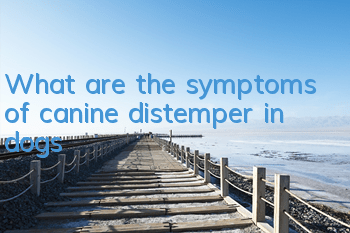Symptoms of canine distemper in dogs:
1. Overall performance. The affected dog has a loss of appetite or simply refuses to eat, is lethargic, and changes in body temperature are biphasic, that is, the body temperature first rises to 39-41 degrees, lasting for 1 to 3 days, and then gradually subsides, approaching normal temperature, and occurs again a few days later. The body temperature rises and can lead to death in severe cases.
2. Respiratory system type (pneumonia type). It manifests as rhinitis and conjunctivitis, with serous or mucopurulent discharge from the eyes and nose. If it causes ocular neuritis, it can lead to blindness. Viruses invade the lungs and cause interstitial pneumonia, and secondary bacterial infection can cause bronchopneumonia. Clinical manifestations include cough, dyspnea, and crepitus on auscultation.
3. Gastrointestinal type. Manifested by vomiting and diarrhea. The sick dog had severe diarrhea, occasionally passed bloody stools, and developed tenesmus.
How to deal with dogs suffering from canine distemper:
1. In the early stage of canine distemper, the dog’s body temperature will rise significantly. The owner must dissipate heat for the dog in time. You can Move it to a cooler place, or feed it cool water to cool down. The owner can check the dog's temperature in the morning, noon and night. If the dog's body temperature drops too low, he should consider keeping him warm.
2. After the dog gets canine distemper, the owner can go to the pharmacy to buy fever medicine, anti-inflammatory medicine and antibiotics, distribute them appropriately according to the weight of the dog, and let the dog take them 2-3 times a day. If the dog doesn't take the medicine, the owner can feed it with a syringe.
3. For owners who have no treatment experience, they can send their dogs to the pet hospital as soon as possible for veterinary treatment. After recovery, the owner can feed the dog some nutritional supplements to help it supplement nutrition and improve immunity to prevent it from contracting canine distemper again.








